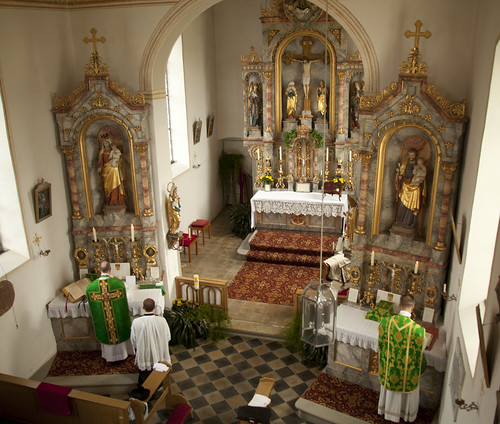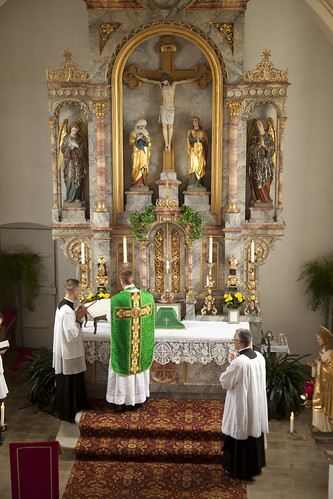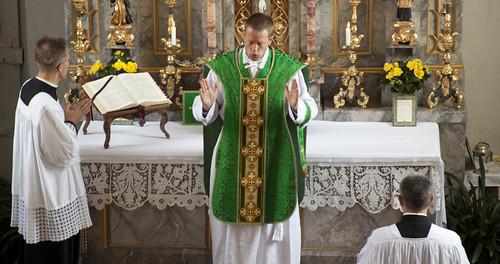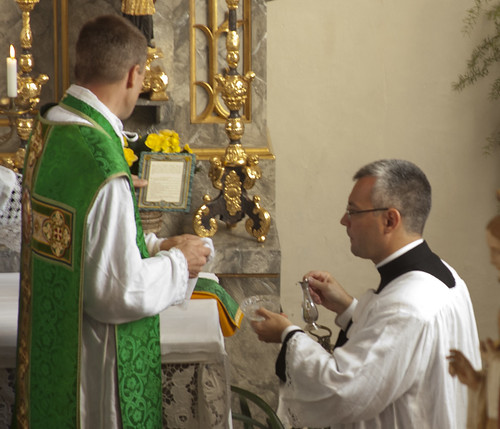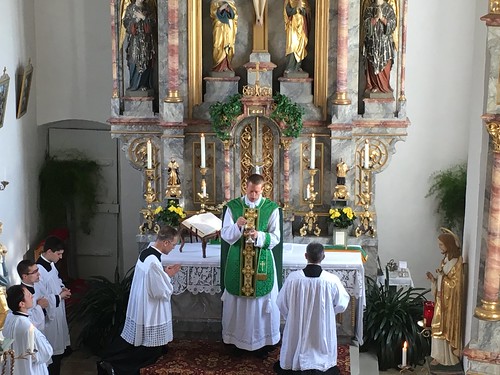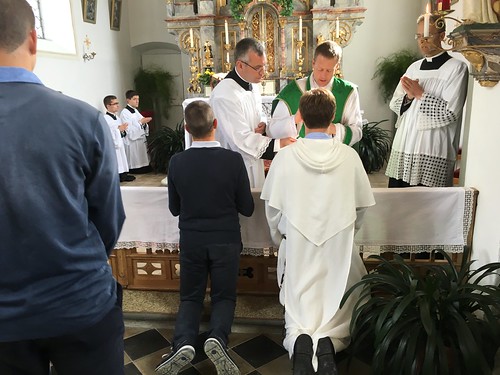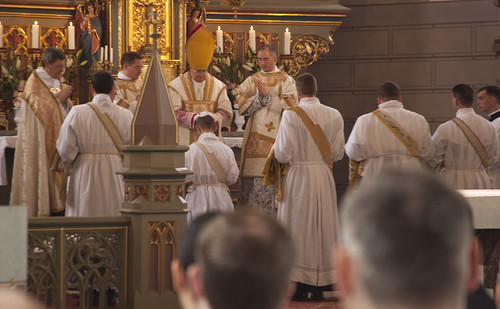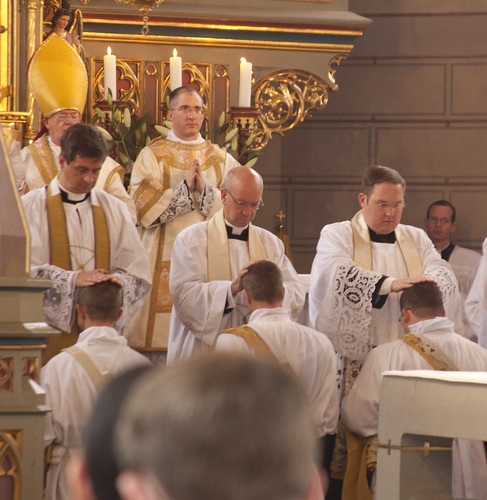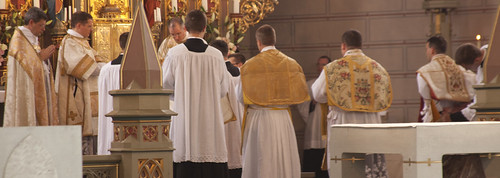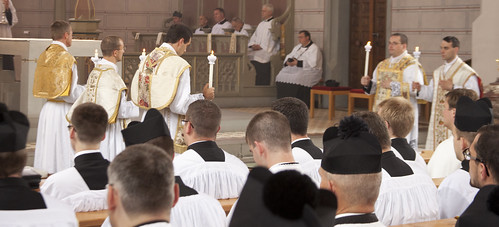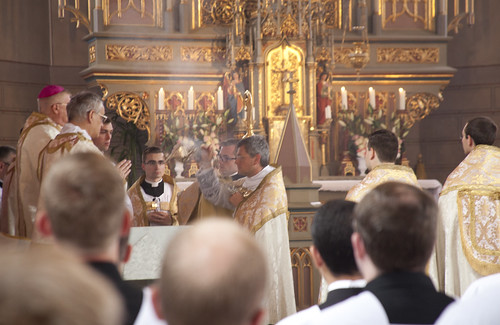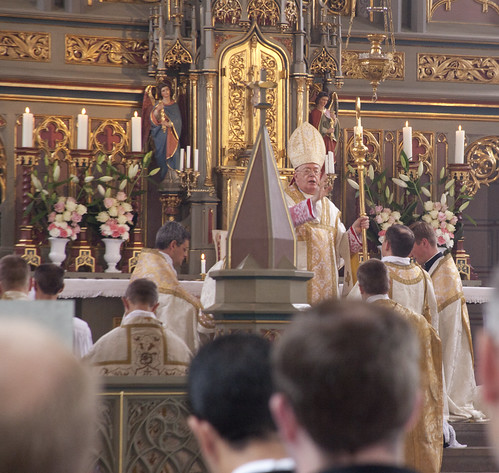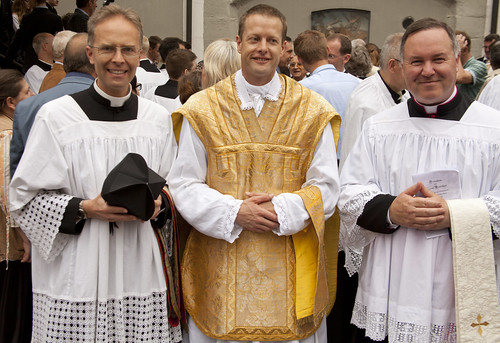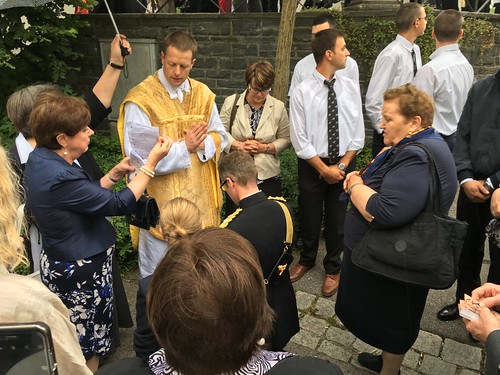Chairman's Blog
High Mass for the Persecuted Church, in London, Friday 29th
 St Mary Moorfields, Friday 29th July, 7:30pm, High Mass celebrated by Fr Michael Lang Cong Orat. St Mary Moorfields is on Eldon Street at EC2M 7LS: click for a map.
St Mary Moorfields, Friday 29th July, 7:30pm, High Mass celebrated by Fr Michael Lang Cong Orat. St Mary Moorfields is on Eldon Street at EC2M 7LS: click for a map.
Support the work of the LMS by becoming an 'Anniversary Supporter'.
Book launch 20th July in London: Fr Lanzetta: Vatican II, a Pastoral Council
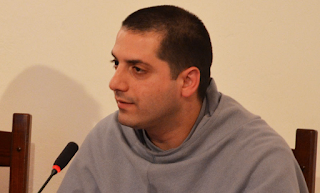 The Latin Mass Society is sponsoring a book launch in London for Fr Serafino Lanzetta's book: 20th July, from 6:30pm, in the basement of St Mary Moorfields, Eldon Street, London, concluding with Vespers at 8pm with the Schola Gregoriana of Cambridge.
The Latin Mass Society is sponsoring a book launch in London for Fr Serafino Lanzetta's book: 20th July, from 6:30pm, in the basement of St Mary Moorfields, Eldon Street, London, concluding with Vespers at 8pm with the Schola Gregoriana of Cambridge.Following the historical development of the idea of the council and its form (see the first chapter of my book), it is interesting to learn that it is not the juridical concept of “representation” (a council represents the Church) that defines a council in the strict sense – the conciliarists of the XIV century had mastered this concept in order to subordinate the Pope to the council – but rather the need, that was already felt at the first ecumenical council of Nicea, to defend the faith and to teach the truth: the greatest spiritual gift. The issue of a council has never been its infallibility, but the necessity to teach the truth.
Also those who see Vatican II as a break from Tradition, in my humble opinion, over-estimates the Council, dogmatising and infallibilising each of its doctrines, even those that are more dispositions or pastoral teachings relative to times, which were judged as new. If, in the judgement of some theologians, a solid biblical foundation is missing in order to establish, in the external forum, religious liberty as a foundation of a Christian State, from which “tolerance” towards the exercise of other religious cult is derived, how much more unsteady will such a biblical foundation be when one places all religions, because such, on the same level with regard to the exercise of cult in civil society, leaving to the laity the responsibility of announcing the Gospel to all? Does the State no longer have any obligation towards God and the religio vera? I refer, to the example of positive religious liberty (exercised in the external forum) because it is one of the most debated subjects, whereas negative religious liberty remains biblically and traditionally clear (no matter of faith can be forced on someone’s conscience). This is one of the topics, perhaps the most heated, that requires like others, greater elasticity. It is necessary for Vatican II to be both read and interpreted for what it is, according to its mens, and not according to a personal (political) inclination towards the ecclesiastical right or left-wing, or a subjective sensitivity towards the conservative or progressive. Already in 1968 Dietrich von Hildebrand proved that a mere contraposition between conservatism and progressivism is simply sterile: the point is either truth or prevarication, the truth or a “spiritual house of cards”.
For this purpose, based on other studies that have been published along the same line, it has been my desire to interrogate the Council as such. I have sought to re-discover – as far as it has been granted to me and save for a better judgement – the mens of the Vatican on certain key doctrines. The theologian is interested in understanding above all, so as to move with surety, the grade of magisterial teaching of the doctrines that we have before us. Precisely because this is not always clear, it is necessary to have recourse to a systematic study of the Council’s sources. The grade of magisterial teaching to which corresponds a theological note and on the other hand, a theological censure – I re-engage the topic of notes and censures that are so indispensable to the theological discussion –, with which to indicate a doctrine, allows us to examine the conciliar doctrines in a sure way; and there, where one finds the need because dealing with doctrines not yet definitively taught, to also be able to indicate some suggestions for an organic dogmatic progress, realised in any case by the Church’s magisterium. Upon examining these doctrines, which are among the most important and significant in the whole magisterial structure: Scripture-Tradition, members of the Church/belonging to the Church, episcopal collegiality, the mystery of the Blessed Virgin Mary in Christ and in the Church, I have reached the conclusion that we find ourselves before truths to which could be attributed the following theological note: “sententiae ad fidem pertinentes”, that is doctrines “upon which magisterium has not yet pronounced itself definitively, whose negation could lead to placing other truths of the faith in danger and whose truth is guaranteed by their intimate connection with revelation” (see pp. 423-432 of my book). A subsequent dogmatic development would still be possible for these doctrines, to reach the grade “definitive tenenda” and higher still, to their proclamation as dogma of faith. For a fair number of theologians in Council, only the question of the “sacramentality of the episcopate” is a definitive doctrine. Also on this point, however, there is no unanimity.
The verification of the so-called “mens Sanctae Synodus” could be seen by some as a light-hearted or even dangerous exercise, since it is up to the Magisterium to justify itself. Such a cutting off however, would abolish the very being of theology and contradict the repeated invites of the Council’s General Secretariat to read the proposed doctrines from the conciliar magisterium (not dogmatically defined nor held definitively, which would not require any interpretation because self-explanatory and would therefore be clear) with the spirit of the Council itself, a spirit that can be deduced from the subject dealt with and from the manner of expression, in accordance with the norms of theological interpretation.
The distinctiveness of my work consists in the fact that, with the aim of faithfully interpreting these doctrines of the Council, I avail myself of numerous first-hand sources. The numerous expert reports of theologians of the Doctrinal Commission were of great importance to my work, and which in the hierarchy of fonts, are to be placed at a much higher level than personal diaries, following straight after the Synodal Acts. They constitute the most authentic testimonies of what the theological mind of the Council prepared for the discussions, modifying or improving them based on the Council discussions, accepting or not the so-called modi presented by the Fathers. It is not hard to find the theological theses of various experts of the majority positions within the Commission. To follow the discussion of the Doctrinal Commission step-by-step is of great epistemic help in order to correctly evaluate the discussions of the Fathers in session. The Fathers frequently depended on their theologians, but their theology did not always depend on the Church’s Tradition. This is also a factor that one must bear in mind, and that can settle, so I think, many discussions that are still open regarding the correct hermeneutics of the Second Vatican Council.
Support the work of the LMS by becoming an 'Anniversary Supporter'.
Fr James Mawdsley FSSP: first Mass
I was last at Wigratzbad seven years ago, to attend the ordination of Fr William Barker FSSP, now living and working in Rome, in the Fraternity's church of Sta Trinita and at the Pontifical Commission Ecclesia Dei. Fr Barker celebrated his first Mass in the charming and tiny church of the village of Mywiler, and it was here, too, that Fr James Mawdsley celebrated his own first Mass. Here are my photos.
(At this point my camera developed a glitch.)
Support the work of the LMS by becoming an 'Anniversary Supporter'.
Masses for Anthea Craigmyle
 For the record, anyone wishing to attend Mass for Anthea Craigmyle can do so as follows.
For the record, anyone wishing to attend Mass for Anthea Craigmyle can do so as follows.
Monday 18th July, 11am: Church of the Immaculate Conception, Farm Street (address: 114 Mount St, London W1K 3AH: click for a map). Ordinary Form Requiem Mass, followed by a reception.
Tuesday 19th July, 11am: Chiswick New Cemetery (address: Staveley Road W4 2SJ: click for a map). Traditional Sung Mass and burial. Mass will be in the cemetery's mortuary chapel; parking is available next to it.
(If you're coming from the Hogarth Roundabout, head West down Burlington Lane, following signs for the M3 and Kew. Burlington Lane turns into Great Chertsey Road, and a little later you turn right onto Staveley Road at a junction with traffic lights. The cemetery is immediately on your left.)
Wednesday 18th August, 11am: the Little Oratory, at the London Oratory (address: Brompton Rd, London SW7 2RP: click for a map). The 'month's mind', Traditional High Mass accompanied by Oratory singers, who will sing Anerio's Requiem. The 'Little Oratory' is not in the main church, but the other side of the small car park.
These are public services, everyone is welcome to attend.
I would like to record my thanks for the many Masses offered already or to be offered soon by the family's many priest friends. We are truly blessed in your generosity.
Support the work of the LMS by becoming an 'Anniversary Supporter'.
FSSP Ordinations in Bavaria
There are other and better photos around of this but I might as well put up those I have. Archbishop Pozzo, Secretary of the Pontifical Commission Ecclesia Dei, was the ordaining bishop. It took place in St Margaretas Church, Heimenkirch, not far from the FSSP Seminary at Wigratzbad.
The Church in England was well represented at the ordinations. Here Fr Bede Rowe lays his hands on James Mawdsley, just ordained. Archbishop Pozzo was assisted by two English priests of the Fraternity, Fr William Barker from Rome and Fr Ian Verrier from Reading - the latter is visible in the photo above, above Fr Bede.
Fr John Berg, the Superior General of the Fraternity, incenses the Archbishop.
Fr James Mawdsley FSSP between Fr Armand de Malleray FSSP and Canon Walsh from Preston, of the Diocese of Lancaster.
Fr James gives a 'first blessing' to his twin brother, a Lt-Col, who attended in a splendid dress uniform.
Those ordained were: Simon Grauter (from Germany), James Mawdsley (from England and Australia), Gregor Pal (from Germany), Michael Parth (from Austria), and Jakub Zentner (from the Czeck Republic).
Support the work of the LMS by becoming an 'Anniversary Supporter'.
Of your charity...
 Please pray for Anthea Craigmyle, who died peacefully, this morning, aged 83.
Please pray for Anthea Craigmyle, who died peacefully, this morning, aged 83.
She was at home, surrounded by her family.
Requiem aeternam do ea Domine, et lux perpetua luceat ea.
I will not be posting for a few days.
 |
| Feeding hens. |
 |
| The Prodigal Son. |
 |
| Tobias and the fish. |
Support the work of the LMS by becoming an 'Anniversary Supporter'.
The Traditional Mass and the Laity
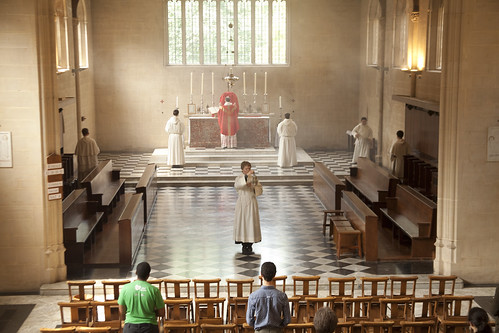 |
| The congregation is blessed with incense as the celebrant carries on the prayers and ceremonies at the Altar. Dominican Rite Mass in Oxford. |
Over on Rorate Caeli I am publishing today a Position Paper on the Laity in the Traditional Mass. It is a response to the argument that the Traditional Mass exemplifies 'clericalism', because it doesn't have swarms of lay peope in the sanctuary, reading the lessons, cleansing the sacred vessels, leading prayers and hymns and distributing communion. Read it here.
The key point of the paper is that, while at least some 'special' lay roles in the liturgy are perfectly defensible - serving and singing being the obvious examples - even these don't exist for the sake of the liturgical participation of the people doing them. This is a crucial point. Without it the rest of the congregation may well feel excluded wrongly from graces available only to the parish elite.
The situation common in many parishes, of mass involvement of the laity in liturgical functions, can lead sometimes to an unedifying competition among lay people to be involved in this way. In other cases it can lead to a frantic attempt by the celebrant or some lay side-kick to conscript lay people for these roles in the minutes before Mass starts. It has become so embedded in the practice of the Novus Ordo that not long ago I noted on this blog that it hadn't apparantly occured to people that the celebrant could read the Epistle at Mass. If people aren't involved, the assumption is, if people are bustling about, then there is a problem. If this is so, there is a problem whenever there is more than a handful of people at a Mass, because the majority of them will not be 'involved' in this way. Pope St John Paul II was obliged to remind us that it is possible to participate by listening, and not only by speaking.
In the Position Paper the argument is made that this attitude towards liturgical involvement derives from clericalism: from the idea that only clerics count in the Church, and so lay people have to approximate to clerical status, or take over clerical roles, to join the party. Another aspect of the problem is that lay Catholics have forgotten what it is to participate in the liturgy in an interior and spiritual way. The experience of the Traditional Mass, with its silent canon encouraging a period of contemplative, and probably mostly wordless, prayer, is I know a challenge for some Catholics. Even those who come to love it can find it takes a bit of getting used to. It has something very important to teach the Church.
Here are some words from Pope Benedict on the silent canon.
Anyone who has experienced a church united in the silent praying of the Canon will know what a really filled silence is. It is at once a loud and penetrating cry to God and a Spirit-filled act of prayer. Here everyone does pray the Canon together, albeit in a bond with the special task of the priestly ministry. Here everyone is united, laid hold of by Christ, and led by the Holy Spirit into that common prayer to the Father which is the true sacrifice—the love that reconciles and unites God and the world.
They are quoted in the Position Paper on Silence available here.
Support the work of the LMS by becoming an 'Anniversary Supporter'.
The Roman Church must stop attacking Eastern Liturgical Traditions
(I'm posting this in light of the recent Synod in Crete.)
But the Roman Church does not attack these traditions, I hear my readers cry! Well, no, but yes.
Here are some extracts from the FIUV Position Paper on the Traditional Mass and the Eastern Churches.
... the Latin reform saw the almost universal abandonment of the Latin tradition of liturgical orientation: the celebration of Mass by a priest facing liturgical east, which meant (outside a small number of exceptional churches), facing the same way as the Faithful. The promotion of this change, which was not discussed by the Second Vatican Council and has never been made obligatory in the Latin Church, has been accompanied by a polemic against the traditional practice, which is disparagingly described as ‘the priest turning his back on the people’. This polemic is not endorsed in the Church’s official documents and has often been criticised, notably by Pope Benedict XVI. It is, nevertheless, very widespread, and is clearly applicable to the tradition of worship ad orientem in the Eastern Rites. The Congregation for the Oriental Churches has felt it necessary to address the issue in the Instruction Il Padre, (107):
It is not a question, as is often claimed, of presiding the celebration with the back turned to the people, but rather of guiding the people in pilgrimage toward the Kingdom, invoked in prayer until the return of the Lord. Such practice, threatened in numerous Eastern Catholic Churches by a new and recent Latin influence, is thus of profound value and should be safeguarded as truly coherent with the Eastern liturgical spirituality.
In a similar way, the same Instruction finds it necessary to defend the Eastern tradition of the distribution of Holy Communion only by clerics; a longer Eucharistic Fast than in force today in the Latin Church; a ‘penitential orientation’ to the liturgy; and the use of traditional sacred art and architectural forms for churches. All of these are features of the Latin liturgical tradition which have been subject to criticism, disparagement, and even ridicule, in the course of the debate over the liturgical reform.
An earlier document from the Congregation for the Oriental Churches, the 1984 Instruction Observations on: ‘The Order of the Holy Mass of the Syro-Malabar Church 1981’, furnishes still more examples of the same phenomenon. Reference is made to a popular theological critique of silent prayers in the liturgy.
It is sometimes said that all liturgical prayers should be said aloud so that everyone can hear them. This is a false principle both historically and liturgically. Some prayers are specifically designed to be said during singing or processions or other activities of the people, or are apologies pro clero. Just as the clergy do not have to sing everything the people chant, so too the people do not have to hear all the prayers. Indeed, to recite all prayers aloud interrupts the proper flow of the liturgical structure.
The attack on silent prayers in the Mass is also strongly opposed by Pope Benedict. It is by no means part of the official theology of the Reform, and indeed the Missal of 1970 contains a number of silent priestly prayers. It is nevertheless true that the Reform, and its implementation, has moved the practice of the Latin Church very much away from silent prayers, and this has given an opening to a theological polemic, to the effect that such prayers wrongfully exclude the Faithful from liturgical participation.
The Instruction Observations also directs the Bishops of the Syro-Malabar Church to resist Latinising tendencies which would import unscripted prayers into their Rite; the proclamation of the Scriptures from a lectern instead of from the Altar; over-elaborate offertory processions; and spontaneous bidding prayers. On the last issue, it notes, in relation to liturgical experiments in the Latin Church: ‘There is no need to imitate the failures of others'.
...
Popular theological polemics against numerous aspects of the Church’s shared liturgical tradition, and even the notion of a tradition, undermine the programme of preservation and restoration of Eastern Rites called for by the Second Vatican Council, and undermine professions of respect for the traditions of Eastern Christians not in communion with Rome.
(Read the whole thing here.)
Support the work of the LMS by becoming an 'Anniversary Supporter'.
Now to rebuild Europe
Support the work of the LMS by becoming an 'Anniversary Supporter'.
Guild of St Clare: 'Memory Quilt' day course
Quilt making is not just for Americans; we have a wonderful tradition of quilt making in the UK as well. The Guild of St Clare is making this tradition available to a new generation in an initial class on quilting on 16th July. It is intended for beginners and the less experienced.
Quilting using pieces of left-over fabric is the classic of thrifty sewing; using fabric from old clothes and such-like it is a way of preserving the memory of articles which would otherwise be thrown away and forgotten. This pleasant idea gives us the notion of the 'memory quilt'.
It is also an opportunity to practice sewing-machine and many other sewing skills.
For all the details see here.
Support the work of the LMS by becoming an 'Anniversary Supporter'.

